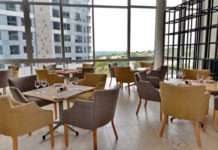President Cyril Ramaphosa has reiterated South Africa’s unequivocal call for an “immediate and comprehensive ceasefire” in Gaza, Palestine.
The President on Friday delivered the country statement of South Africa during the 19th Non-Aligned Movement (NAM) Summit being held in Uganda.
The Israeli-Palestinian war erupted in October 2023 when militant group Hamas launched a surprise attack on Israel – killing at least 1200 people.
The Israeli retaliation on Palestine has been far greater with estimates that more than 20 000 Palestinians have been killed with the UN Office for the Coordination of Humanitarian Affairs reporting the internal displacement of some 1.9 million people in Gaza.
“South Africa calls for an immediate and comprehensive ceasefire in Gaza. We call for the release of all hostages and the resumption of talks on a just solution that will end the suffering of the Palestinian people. We further call for unhindered and expanded humanitarian access to allow for vital aid and basic services to meet the needs of everyone living in Gaza.
“As a consequence of the ever-worsening situation of the people of Gaza, South Africa has asked the International Court of Justice to issue provisional measures ordering Israel to stop its military campaign in Gaza. This is necessary to protect against further, severe and irreparable harm to the rights of the Palestinian people,” President Ramaphosa said.
The President said the ongoing conflict lays bare the “inadequacy” of global governance organisations such as the United Nations (UN).
“South Africa recently made financial contributions to the UN Relief and Works Agency and the UNHCR [United Nations High Commissioner for Refugees] to support their humanitarian operations in Gaza and the broader Palestinian refugees. In addition, many ordinary South Africans and NGOs have mobilised resources to assist the people of Gaza.
“The conflict has again illustrated the inadequacy of the United Nations, in particular the UN Security Council, in maintaining international peace and security. We should establish a system of global governance that is fair and equitable, and has the capacity to respond to the needs of all persons in situations of threat and harm,” he said.
World challenges
Fixing attention on the Summit, President Ramaphosa said the gathering takes place at a time when international challenges – “exacerbated by geopolitical dynamics and conflicts in various regions of the world” – are abound.
“The wars taking place in Ukraine and Palestine are causing grave humanitarian and health crises and contributing to international instability. The supremacy of multilateralism as embodied by the United Nations Charter and international law is being undermined exactly when it is needed most.
“At a time when the world appears to be once again divided between east and west, the Non-Aligned Movement should continue to assert its independence based on our common values.
“South Africa remains steadfast in advancing its non-aligned approach in the maintenance of international peace and security and advocating for inclusive dialogue and the peaceful political settlement of disputes,” he said.
President Ramaphosa called on the NAM to work together in pursuance of:
- the right to self-determination of the peoples of Palestine and Western Sahara;
- the lifting of the economic blockade against Cuba and unilateral sanctions against Iran, Venezuela and Zimbabwe;
- reaffirmation of the inalienable right of access to nuclear materials, equipment and technology for peaceful purposes;
- upholding the centrality of the UN Charter and international law in the peaceful resolution of conflict;
- defeating the scourge of terrorism and its root causes; and,
- the alleviation and eradication of poverty and underdevelopment.
“This interconnected world calls for a collective determination to achieve the Sustainable Development Goals and to address the economic, social, health and environmental challenges that every country faces.
“We need to give dedicated attention to the reform of global governance institutions, including the United Nations. We must give meaning to the principle of sovereign equality of nations and ensure that the voice of the African Continent and the Global South is strengthened in the broader multilateral system,” he said. – SAnews.gov.za












